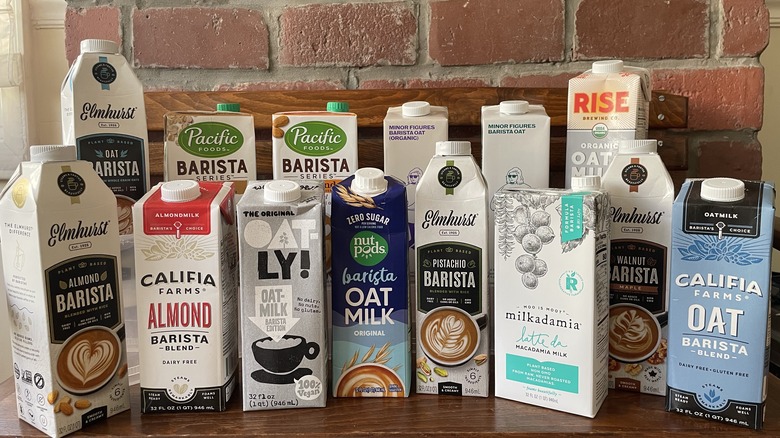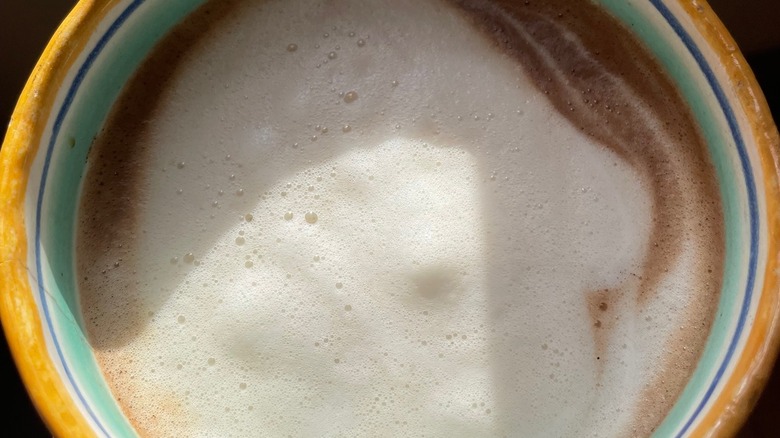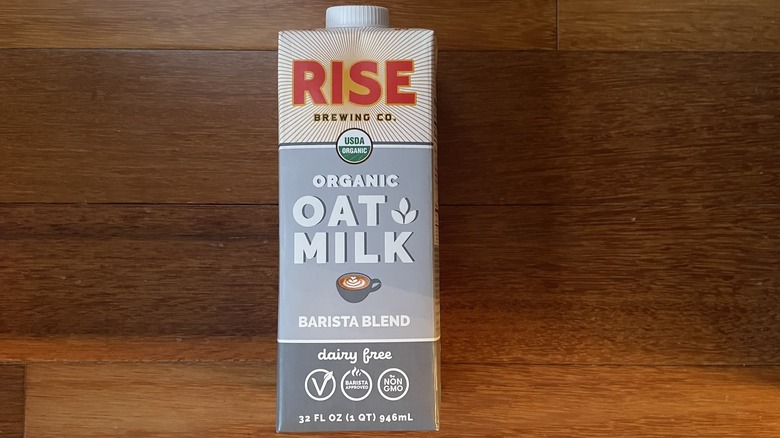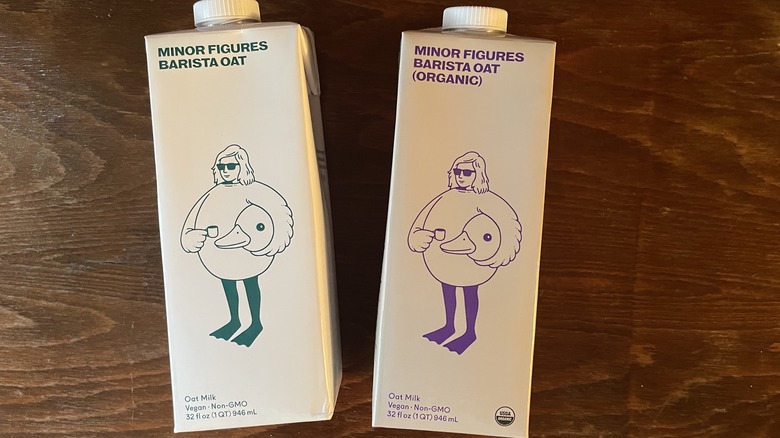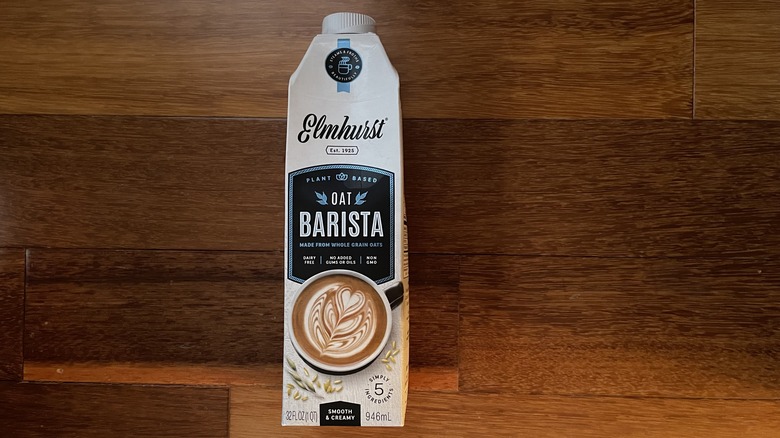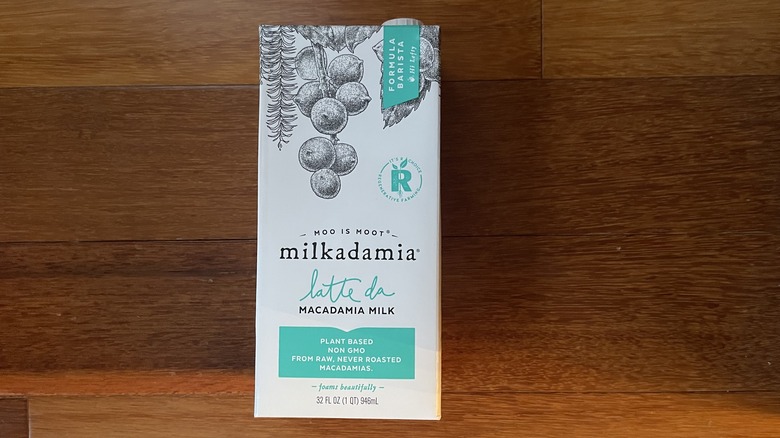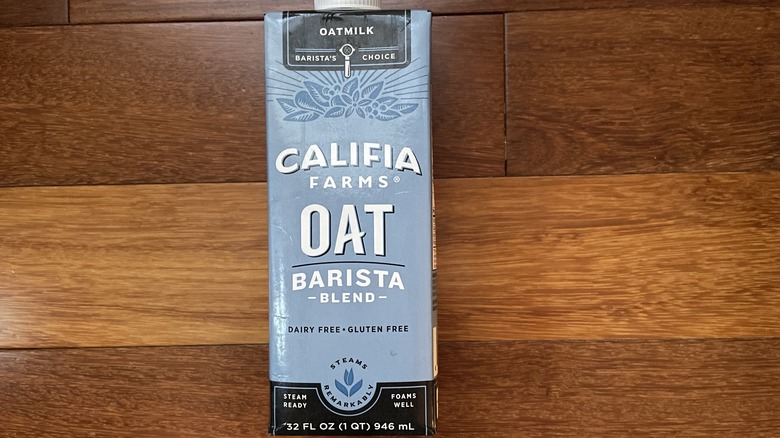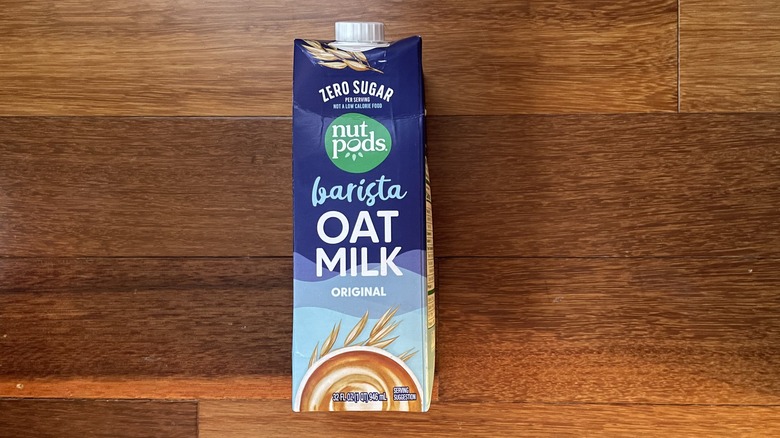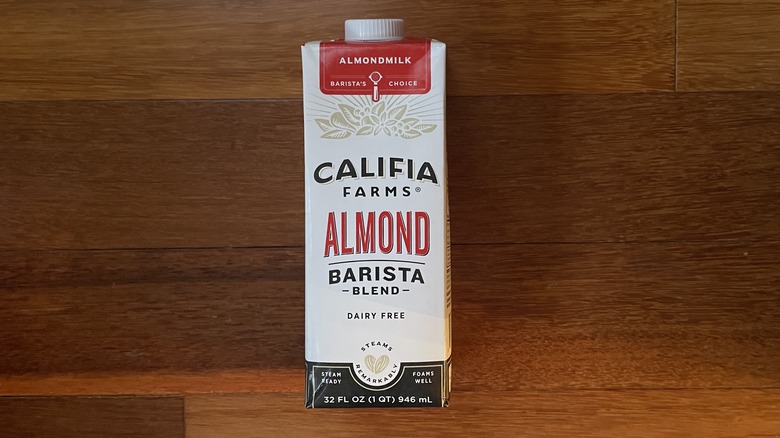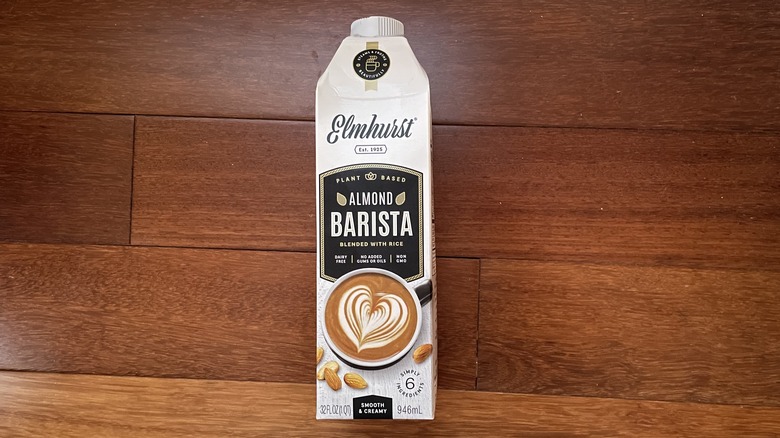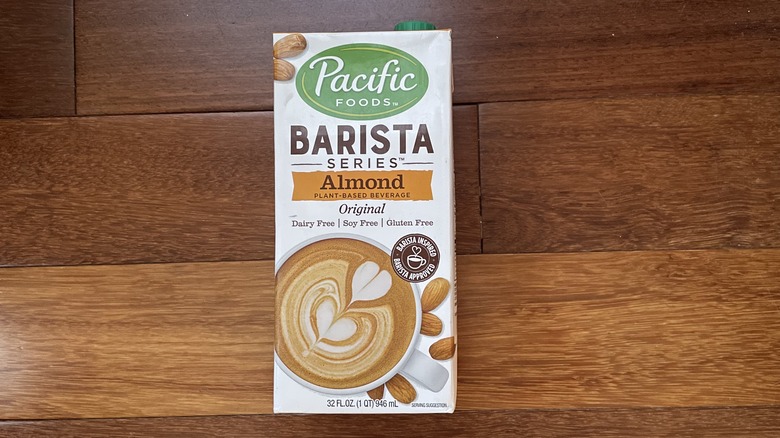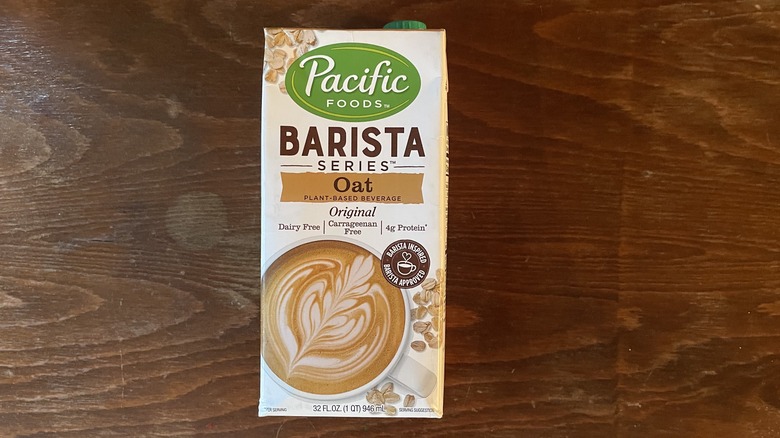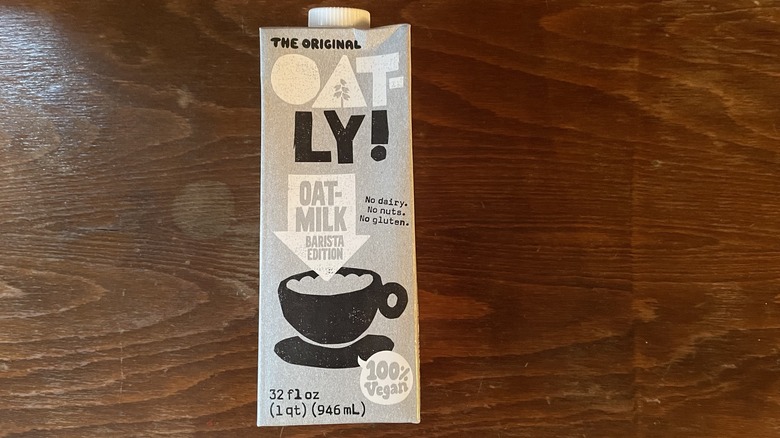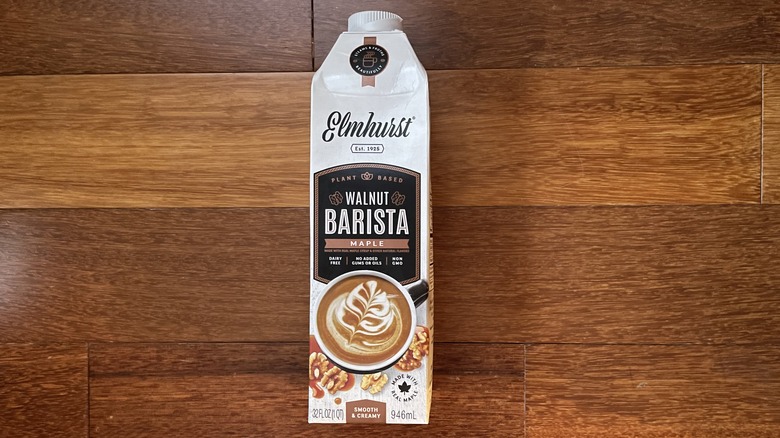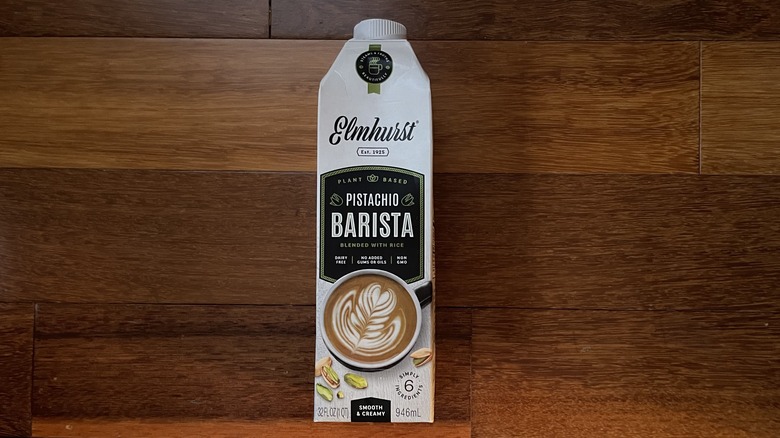We Tested And Ranked 13 Barista Milks In Our Lattes
Coffee shops offer more variety than ever. From seasonally flavored hot or cold drinks to an endless list of syrups, foams, and toppings, there is a combination for any taste buds or dietary needs. It wasn't that long ago that people staying away from dairy were lucky to find one alternative milk for their cup of joe, but now it's common to have several options, from coconut to soy to nut-based to the ever-popular oat. With all these customizations comes a hefty surcharge, inspiring coffee lovers to recreate their favorite lattes at home.
The sheer volume of non-dairy milk, both shelf-stable and refrigerated, can feel overwhelming. While oat milk is a popular choice, there are plenty of other nut and seed-based varieties in everything from no-sugar added to flavored ones. But for the best latte at home and maybe even some latte art, look for barista blend milk.
To rank the best barista milks, we smelled and tasted the milk plain and then made a classic latte, foaming each milk using the same electric frother (note: some online reviews indicated that results might vary if using a steamer attachment on an espresso machine). We judged the milk on overall flavor, texture, and the stability and structure of the milk foam. Any milks that did not foam were given a second test to ensure no outside factors impacted the performance. Prices may vary.
Some recommendations are based on first-hand impressions of promotional materials and products provided by the manufacturer/distributor/etc.
What is a barista milk?
So, what is the difference between regular non-dairy and barista blend milk? It comes down to the fat content. Every variety we tried, except for one, had between 4 grams and 8 grams of fat per 8-ounce serving. While nut-based milk can rely on the natural fat from the nuts, most oat-based milk has added oils to increase the fat content. Gums or lecithins were also widely used across brands to increase the viscosity of the milk. Only one brand stayed away from either, but more on that later.
The reason for the added fat or gums is the key to a barista blend. Dairy milk produces rich, thick, and stable foam from a combination of fat, protein, and lactose, which is the natural sugar in milk. Barista blends aim to achieve a similar result to dairy milk by crafting formulas with a richer, creamier flavor and texture, which requires specific ingredients to mimic the properties of dairy. Added oils will add fat, while gums or lecithins take the place of protein to add volume and stability to the foam.
Rise Brewing Co. Organic Oat Milk Barista Blend
This shelf-stable, certified organic oat milk is one of the more expensive options, with prices ranging from $6 to $7 per 32-ounce carton. The main ingredients are water, organic oats, and organic sunflower oil. The milk is a tan color and has a strong oat aroma and flavor that almost tastes like the oats have been toasted. The milk imparts a bitter aftertaste and is more watery than creamy tasting.
This milk does not improve in flavor or texture once frothed. The milk does not create any real foam, just a thin layer of bubbles that sit briefly on top of the coffee. The bitter aftertaste carries through and dominates the latte, giving the whole drink a slightly burnt flavor. Despite lightening the color of the coffee, there is no creaminess to the drink. Unfortunately, this milk didn't win many points in either taste or frothing ability, creating its low ranking.
Minor Figures Barista Oat (Original and Organic)
Minor Figures is made in Canada and available at Whole Foods Market, where a 32-ounce shelf-stable carton retails for $5.29. Available in an organic and non-organic version, the nutrition stats are almost the same, as are the key ingredients of water, oats, and sunflower oil. In the organic version, both the oats and the oil are organic. Both are suitable for vegans, kosher, and halal, but only the original is labeled calcium-rich with a 22% daily value of calcium per serving from added calcium carbonate, an ingredient absent in the organic version.
Despite more similarities than differences in the packaging, the flavor and performance of the milks are quite different. The original version has some bitterness to it and tastes a little watery. It does not foam at all and stays exactly the same texture as out of the carton. The organic milk tastes creamier and has a nice balance of nutty oats and sweetness, but again falls short when creating a foam. There is a modest amount of foam after frothing, but not nearly enough to satisfy the creamy layer that is a hallmark of a satisfying latte.
Elmhurst 1925 Barista Oat Milk
This refrigerated barista oat milk is the only oat milk in this testing group without added gums or oils. It is also the outlier regarding total fat content, coming in at only 1 gram per serving, which makes sense because the main ingredients are just water and oats. It is also one of the more expensive options, priced from around $5 to almost $7 per 32-ounce container.
The caramel-brown color of the milk is notably darker than others. It tastes strongly of oats and is a little watery. Surprisingly, it creates a nice amount of froth, though there is also a good amount of un-foamed milk. However, the coffee itself doesn't lighten much when the milk is added and doesn't taste creamy at all. The foam lacks density and almost immediately starts losing air and sinking into the cup, creating a striped separation of coffee and milk. While other varieties from this brand performed very well, this particular option is not the best choice.
Milkadamia Barista Latte Da
Milkadamia is a brand crafting non-dairy milk using raw macadamia nuts as the base. The main ingredients are water, macadamia nuts, and sugar. There are added stabilizers, including gellan gum and sunflower lecithin, but no added oil. Despite the natural richness of macadamia nuts, this milk isn't overly caloric, at 80 calories and 4.5 grams of fat per 8-ounce serving. It is priced at $4.99 at Whole Foods Market, making its price point on par with other brands.
The initial flavor and aroma of the milk is surprising. There is a fruitiness unexpected in nut-based milk. It has notes, possibly of orange or vanilla, but it is hard to be sure that is exactly the flavor. The packaging isn't helpful, but the listed "natural flavor" does help explain its presence. The intensity of the coffee itself tones down those flavor notes but overall leaves a slightly off flavor in the latte that detracts from a moderate amount of creaminess. Flavor aside, this milk does not deliver on foaming power. The package states on the front that it "foams beautifully," but all that came out of the frother was a thin layer of slightly thickened milk and no real foam at all.
Califia Farms Oat Barista Blend
Califia Farms makes an expansive assortment of non-dairy milk, creamers, cold coffees, and premixed flavored coffee drinks. The barista blend milks are shelf-stable, and the price ranges from about $4 to $6 per 32-ounce container. The main ingredients are water, oats, and sunflower oil. Notably, minerals are also listed on the label, including enough calcium to reach 20% of the daily value per serving. It's hard to say if this impacts the flavor or texture of the milk, but it is not a common ingredient between brands.
The milk is a creamy ivory color but tastes watery and bland. There is little discernible sweetness and a strong oat flavor. Frothing thickens the milk slightly but does not create a defined layer of foam. Once chilled, the milk did produce slightly more foam, but it lacked density and quickly lost its volume. While the latte is creamy tasting, the oat flavor is pronounced. There is a slightly bitter aftertaste, in addition to some residual dryness on the tongue. Both the bitterness and dryness lessened after the milk was chilled, but were still discernible.
Nut-Pods Barista Oat Milk Original No Sugar
This is the only milk in this test with zero added sugar. The main ingredients are water, oats, erythritol, and high oleic sunflower oil. It is also certified gluten-free, which is not always a given with oat milk. The milk is more white than beige. It doesn't taste thick but is initially pleasant with a mild oat flavor. The erythritol adds some sweetness but also adds an aftertaste that some may be sensitive to. The price for this 32-ounce container ranges from $5 to $6.
This milk froths nicely, with the majority of the milk transforming into foam with a medium density. It is much harder to pick out any aftertaste from the erythritol once combined with coffee, and the oat flavor also doesn't come through. Despite the coffee lightening to a pleasant color and blending smoothly, the latte is not as creamy as other oat-based varieties. It is a good choice for someone who is looking for a no-sugar option and tolerates sugar alcohol well, putting it in eighth place.
Califia Farms Almond Barista Blend
This shelf-stable milk was one of the easiest to locate, available at a large selection of retailers with a price typically between $5 and $6 per 32-ounce container. The main ingredients are water, almonds, and sugar. There are no added oils, but there are guar gum, gellan gum, and sunflower lecithin as thickeners and stabilizers in addition to natural flavors. This also features a hefty boost of calcium with 30% of the daily value in an 8-ounce serving.
The milk is a pretty white color. It has a silky texture and a nice balance of sweetness and almond flavor with almost no bitterness. Frothing is where this milk fell short. After frothing, the milk looked like hot milk with a layer of large bubbles on top, not unlike dish soap bubbles. There was no foam at all. It did mix cleanly with the coffee with no separation or curdling, and the flavor was creamy and not too sweet. This is a nice choice for someone who wants some heated almond milk in their coffee, but it's not the one to pick for a latte.
Elmhurst 1925 Barista Almond Milk
This milk has an unexpected ingredient: rice. The main ingredients are water, almonds, and rice, and like all the barista milk from this brand, there are no added gums or oils. Stocked in the refrigerated section of the supermarket, the price ranges from around $5 to almost $7.
The milk is off-white with a pleasantly sweet almond flavor. While not thick, the milk has a slightly slippery texture that gives it some viscosity. The milk does froth and holds a defined layer that sits nicely on the coffee. It isn't as dense a foam as some other milks but does not dissipate quickly. Similar to other almond-based milk, the latte doesn't taste very creamy, and the strong flavor of the almond milk stands apart from the flavor of the coffee. It would be a good option for someone who enjoys the flavor of almond milk, but those looking for something more neutral will have better luck choosing something else.
Pacific Foods Barista Series Almond Original
Pacific Foods offers a wide variety of shelf-stable plant-based milks in addition to a few barista options. Available for $3.79 on Amazon, this is one of the lowest-priced options. The main ingredients are water, sugar, and ground almonds. As sugar is the second ingredient, you would expect it to be very sweet, and it is. But there is also some bitterness, common with almond milk, and the sugar tempers that bitterness. The milk is more white than beige and has a lovely almond flavor.
The milk froths well, creating a generous amount of dense foam. After adding the milk to the coffee, it needs a few stirs to combine with the coffee, but once blended, it does not separate or curdle. Additionally, stirring does not cause the foam to start dissolving, but even after the milk and coffee are combined, the color of the coffee is still quite dark and does not taste particularly creamy. This milk is a solid almond-based choice, understanding that almond and oat-based drinks inherently offer different creaminess. If you are willing to trade a little creaminess for a durable thicker foam, this option at No. 5 is for you.
Pacific Foods Barista Series Oat Original
Another barista option from Pacific Foods is this oat-based milk. Comparable to the almond version in price, this is $3.99 on Amazon. The main ingredients are water, oats, and organic canola oil.
The milk has a creamy ivory color and very oat-forward flavor while also tasting milky. It tastes similar to the bottom of a bowl of creamy oatmeal and is neither too thick nor too sweet. When frothed, the majority of the milk foams leaving a small amount of the milk simply steamed. While the foam isn't particularly dense, it holds its shape well and does not quickly dissolve. The milk blends seamlessly with the coffee, not even needing a quick stir. Once mixed with coffee, the deep oat flavor softens, resulting in a balanced creamy latte that does not scream oat flavor. All of these factors make this barista milk land in the No. 4 spot.
Oatly Barista Edition Oatmilk
Oatly sprung to popularity when Starbucks launched oat milk-based drinks using Oatly oatmilk in 2021. It is the base of some of the most popular (and maybe the best on the menu) drinks: the Iced Toasted Vanilla Oatmilk Shaken Espresso and the Iced Brown Sugar Oatmilk Shaken Espresso. Available at a ton of retailers, from stores to online outlets ranging from Whole Foods Market to Target to Fresh Direct, a 32-ounce carton has a price range from about $4 to $5.50.
The main ingredients are water, oats, and low-erucic acid rapeseed oil. The flavor skews sweet and creamy with a moderate amount of oat flavor. All the milk transforms into a velvety thick foam similar to softly whipped cream that mixes nicely with the coffee and holds a tall layer on top of the coffee. The drink is very creamy and luscious. Once mixed with coffee, the sweetness and oat flavor are greatly decreased, making this one of the more neutral-tasting options and perfect for someone looking to replicate the flavor and texture of dairy without being reminded there are oats. The only negative is that the milk instantly starts crackling and popping in the cup, just like a bowl of crispy rice cereal. The foam does not look like it is dissolving, but the steady hissing indicates that the fine bubbles will not hold for long.
Elmhurst 1925 Maple Walnut Barista Edition
Not quite nut milk and not quite oat milk, this barista milk combines the best of both to create something unique and delicious. The main ingredients are water, walnuts, oats, and maple syrup, and like the other offerings from the brand, it has no gums or oils. The milk is a creamy light brown, only one shade lighter than a latte. It is very creamy and luscious with a strong caramel aroma. Both maple and the walnut are easily tasted, but despite smelling strongly of maple, the milk is not too sweet. Walnuts are naturally tannic, and there is a little of that drying quality to the finish of the milk, but it dissipates quickly.
The milk froths well and blends with the coffee without any separation, creating one of the creamiest lattes in this tasting. The foam texture is not overly thick and has plenty of tiny bubbles that last for the duration of the cup of coffee but not much longer. The maple carries through the drink rather than taking a backseat to the coffee. This milk performs strongly in all aspects to create a delicious latte, but it does not take the top spot simply because the maple flavor is so pronounced and may not be a flavor everyone enjoys or wants in a latte.
Elmhurst 1925 Pistachio Barista Edition
Similar to the almond barista milk from the same company, this pistachio-based milk is blended with rice and has no gums or oils. The color is standard ivory (not a pale green) and has a nutty aroma, but not specifically pistachio. Pistachio is an elusive flavor to replicate if not eating a pistachio nut or paste, and many pistachio desserts add a little almond extract to boost that nebulous flavor. Nothing is added here, leaving the milk to taste creamy and nutty with just the right level of sweetness.
This milk froths unbelievably well. The machine is full of thick medium-dense foam. A few swirls of the milk deflate the foam just enough to easily pour into the coffee and leave a tall crown of white foam. Some coffee purists might argue that the ratio of steamed milk to foam would be more appropriate in a cappuccino than a latte, but the bubbles in the foam are fine and settle quickly into a more modest layer without disappearing. After a quick stir, the milk blends smoothly with the coffee, giving it a pure, creamy flavor. There is no funny aftertaste, just a subtle nutty flavor that gives away it is not dairy milk. Between the texture and flavor, this milk is hard to beat.
